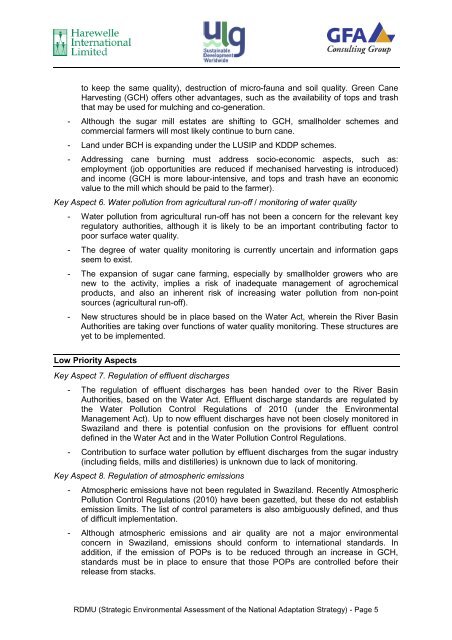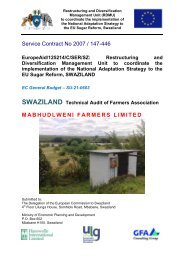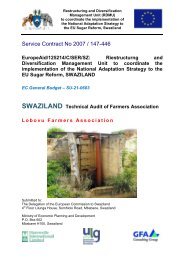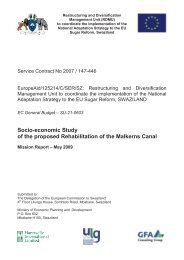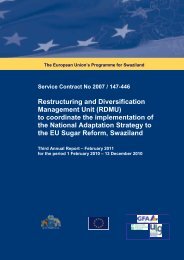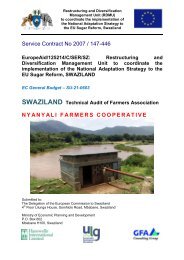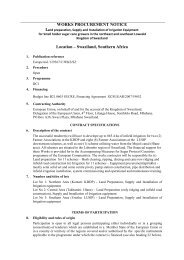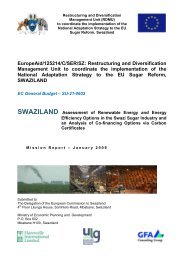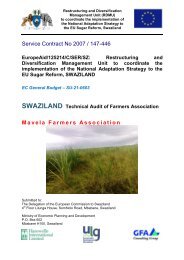Service Contract No 2007 / 147-446 Strategic ... - Swaziland
Service Contract No 2007 / 147-446 Strategic ... - Swaziland
Service Contract No 2007 / 147-446 Strategic ... - Swaziland
- No tags were found...
Create successful ePaper yourself
Turn your PDF publications into a flip-book with our unique Google optimized e-Paper software.
to keep the same quality), destruction of micro-fauna and soil quality. Green CaneHarvesting (GCH) offers other advantages, such as the availability of tops and trashthat may be used for mulching and co-generation.- Although the sugar mill estates are shifting to GCH, smallholder schemes andcommercial farmers will most likely continue to burn cane.- Land under BCH is expanding under the LUSIP and KDDP schemes.- Addressing cane burning must address socio-economic aspects, such as:employment (job opportunities are reduced if mechanised harvesting is introduced)and income (GCH is more labour-intensive, and tops and trash have an economicvalue to the mill which should be paid to the farmer).Key Aspect 6. Water pollution from agricultural run-off / monitoring of water quality- Water pollution from agricultural run-off has not been a concern for the relevant keyregulatory authorities, although it is likely to be an important contributing factor topoor surface water quality.- The degree of water quality monitoring is currently uncertain and information gapsseem to exist.- The expansion of sugar cane farming, especially by smallholder growers who arenew to the activity, implies a risk of inadequate management of agrochemicalproducts, and also an inherent risk of increasing water pollution from non-pointsources (agricultural run-off).- New structures should be in place based on the Water Act, wherein the River BasinAuthorities are taking over functions of water quality monitoring. These structures areyet to be implemented.Low Priority AspectsKey Aspect 7. Regulation of effluent discharges- The regulation of effluent discharges has been handed over to the River BasinAuthorities, based on the Water Act. Effluent discharge standards are regulated bythe Water Pollution Control Regulations of 2010 (under the EnvironmentalManagement Act). Up to now effluent discharges have not been closely monitored in<strong>Swaziland</strong> and there is potential confusion on the provisions for effluent controldefined in the Water Act and in the Water Pollution Control Regulations.- Contribution to surface water pollution by effluent discharges from the sugar industry(including fields, mills and distilleries) is unknown due to lack of monitoring.Key Aspect 8. Regulation of atmospheric emissions- Atmospheric emissions have not been regulated in <strong>Swaziland</strong>. Recently AtmosphericPollution Control Regulations (2010) have been gazetted, but these do not establishemission limits. The list of control parameters is also ambiguously defined, and thusof difficult implementation.- Although atmospheric emissions and air quality are not a major environmentalconcern in <strong>Swaziland</strong>, emissions should conform to international standards. Inaddition, if the emission of POPs is to be reduced through an increase in GCH,standards must be in place to ensure that those POPs are controlled before theirrelease from stacks.RDMU (<strong>Strategic</strong> Environmental Assessment of the National Adaptation Strategy) - Page 5


